
News

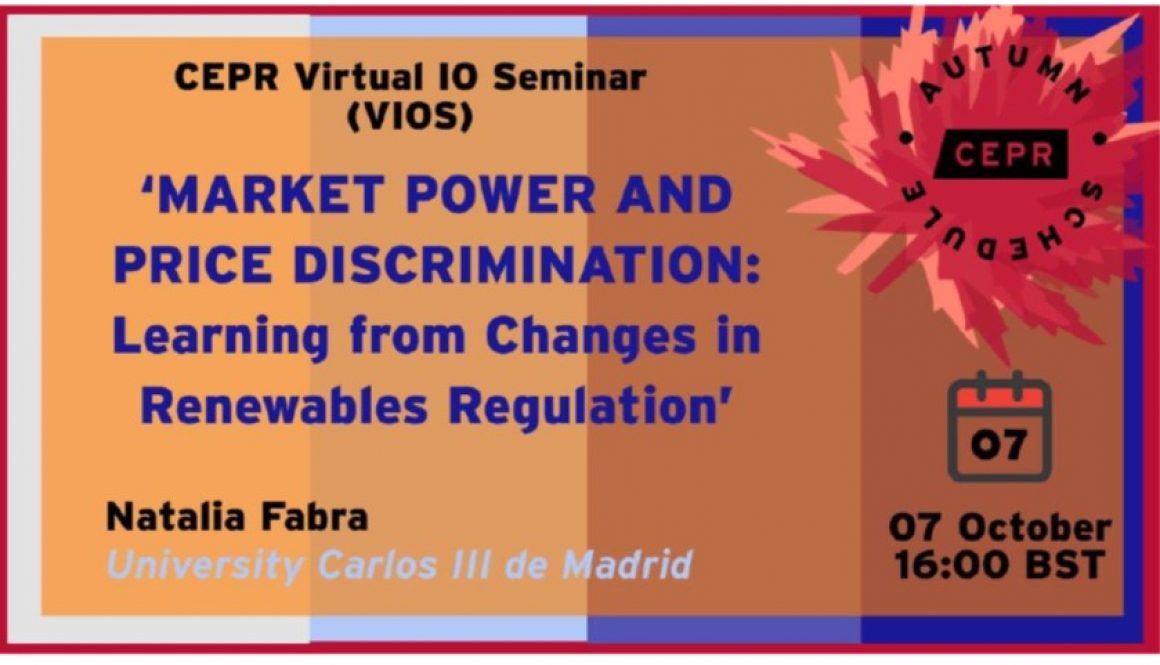
CEPR VIOS Seminar
During the first wave of the pandemic, the CEPR decided to organize a Virtual IO Seminar (VIOS) as a short-run alternative to IO seminars cancelled or disrupted due to travel restrictions brought on by the Coronavirus. The success of this initiative led it, however, to turn it into a permanent platform for sharing the benefits of regular IO seminars. Inn October 2020, Natalia Fabra presented the paper, coñauthored with Imelda, “Market Power and Price Discrimination: Learning from Changes in Renewables Regulation”.
The slides and the video of her talk can be seen here. Upcoming seminars can be found here.
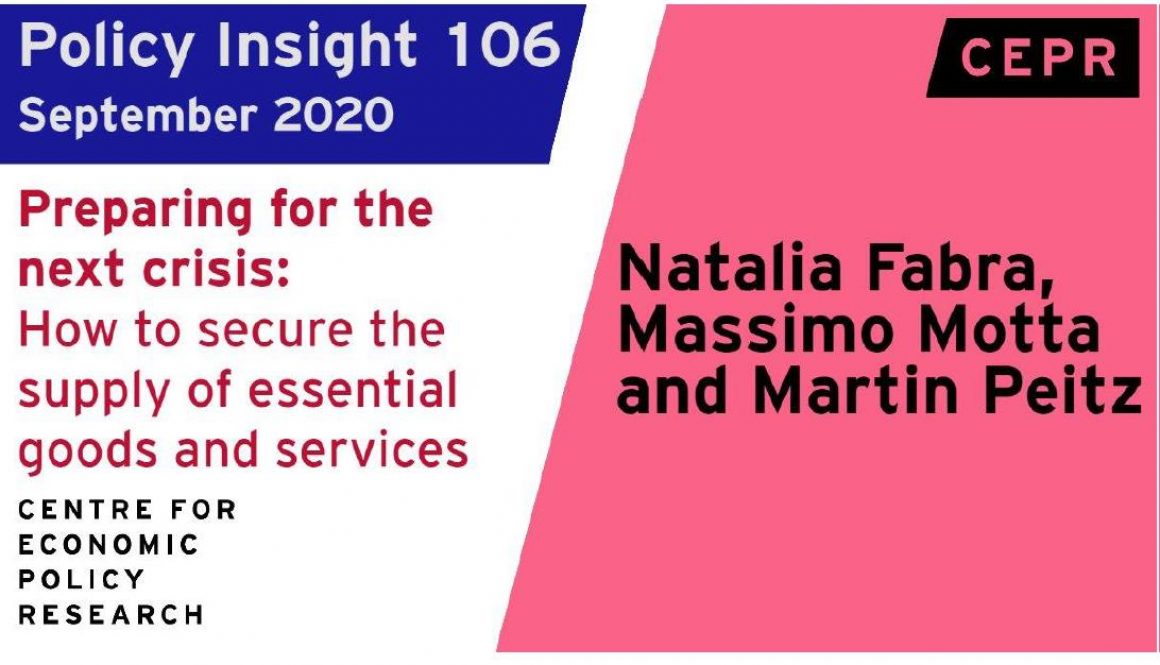
IT PAYS TO BE PREPARED. New Discussion Paper on how to prepare for the next crisis
Why were European states so unprepared for the Covid-19 pandemic, lacking both a coherent strategy and adequate preventative measures? And what can be done to ensure the necessary cooperation, preparation, and resilience for future adverse shocks? States, by their very nature, have a ‘universalistic duty’ to prepare preventative measures for all kinds of crises. These include a robust primary health care system, a strong logistics network, emergency decision-making bodies that combine legitimacy (elected politicians) with expertise (expert advice), and institutions that promote cooperation among countries or regions.
And yet, the Covid-19 crisis has highlighted the potential for severe market failures in the provision of essential goods and services during pandemics and other negative shocks with major impact. Across Europe, there has been acute shortages of medical supplies essential for dealing with the pandemic. Collapsing supply chains and non-existent stockpiling, an over-reliance on production from China, and inadequate government policies have all contributed to this systematic failure. While catastrophic events are difficult to avoid, society must strive to be better prepared for the next one.
Natalia Fabra, together with Massimo Motta, ICREA-Universitat Pompeu Fabra and Barcelona Graduate School of Economics and CEPR Research Fellow, and Martin Peitz, University of Mannheim and MaCCI, have just released a new CEPR Policy Insight, in which they analyze the private and state incentives to take adequate measures before and during a crisis triggered by an adverse shock. They argue that private initiatives are often insufficient to be prepared for rare events with a large negative effect. Instead, governments and international institutions should implement mechanisms which ensure that prevention, detection and mitigation measures are taken.
The findings in this Policy Insight demonstrate that the necessary preparation for catastrophic events should consist of an articulated strategy, which goes from having an adequate research infrastructure and human capital to investing in prevention, and from early detection (in order to mitigate their impact) to building the ability to react should such events materialise. It may be that neither market institutions (e.g. insurance markets) nor an individual country’s initiatives are sufficient to achieve this alone. A strategy based on private (even if mandatory) insurance is likely to be insufficient and difficult to implement. Instead, a resilience strategy should rely on public authorities securing the provision of essential goods in sufficient quantity and quality. This requires putting in place competitive mechanisms to accumulate essential goods, establishing rationing protocols, and facilitating rapid production when the crisis hits.
The report also stresses the importance of fostering ‘Social capital’ to face disasters, which includes building trust in public institutions, a well-functioning administration, and society’s willingness to listen to science and follow public recommendations. In particular, the economics of electricity capacity markets provides important lessons for the provision of essential goods in such events – as a general principle, it is likely that a centralised and targeted mechanism, such as a system of strategic reserves to be procured through auctions, would perform well in most cases.
“These lessons are relevant to coping with the ongoing Covid-19 threat as well as with any future crisis of as yet unknown nature”
The Column summarizing their work can be read here https://voxeu.org/article/building-strategy-resilience
The Policy Insight is available here https://cepr.org/active/publications/policy_insights/viewpi.php?pino=106

EARIE 2020 – Keynote Lecture
Natalia Fabra gave the Keynote Lecture of the Annual Conference of the European Association of Research in Industrial Economics (EARIE).
Unfortunately, due to the COVID-19 pandemic, EARIE 2020 could not proceed in its originally envisioned format. A limited number of invited presentations in an online format took place. The
presentations are available at 2020 EARIE’s website https://eventi.unibo.it/earie2
In her Keynote Lecture, Natalia summarized the ongoing research carried out at energyecolab on the Energy Transition from a Industrial Economics perspective. The slides of her presentation are available here, and the video is here.
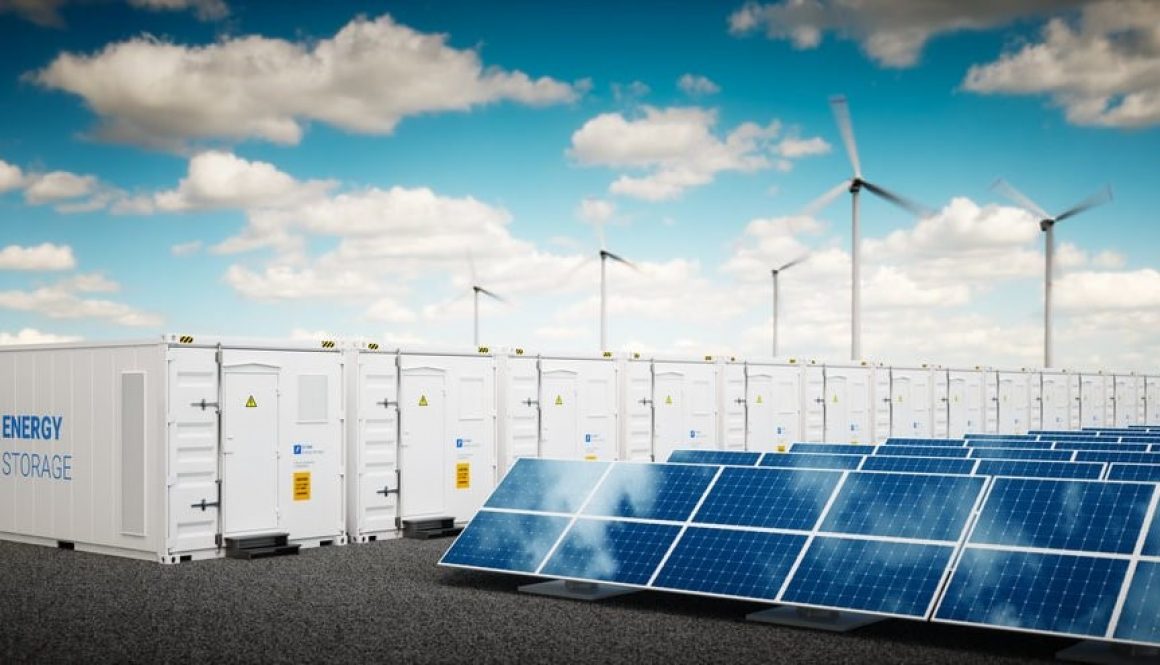
Fundación Iberdrola Research Grant
Our team members, David Andrés-Cerezo and Natalia Fabra, have been awarded a research grant by Fundación Iberdrola aimed at supporting research projects related to the development of renewable energies, the protection of the environment and the efficiency of the energy system.
David and Natalia will work on a project entitled “Storage in Electricity Markets: Investment Incentives and Regulation”. The goal of this one year project is to study the key role of storage technologies in guaranteeing the development of a decarbonized electricity market. Using both theoretical and quantitative methods, they will analyze whether the current economic and regulatory systems are powerful enough to boost the required investments. Also, they will explore regulatory alternatives needed to align private and social incentives for storage investment.
We will publish the output of this research at https://energyecolab.uc3m.es/research-lines/

Virtual Industrial Organization Seminar (VIOS)
The first seminar will be on Wednesday 8th April 2020, at 4:00 p.m. CET. The speaker will be Chiara Farronato (HBS). Details including seminar rules, upcoming speakers, paper downloads, etc. are available on the VIOS website: https://sites.google.com/
In some ways, VIOS is European: in its scheduling, in its affiliation with the CEPR, and in the composition of its scientific committee. For participation, however, it is international: any interested IO scholar is welcome to join.
On behalf of Özlem Bedre-Folie, Daniel Ershov, Natalia Fabra, Rachel Griffith, Alessandro Iaria, Gerard Llobet, and Nicolas Schutz (VIOS Organizing/Scientific committee)
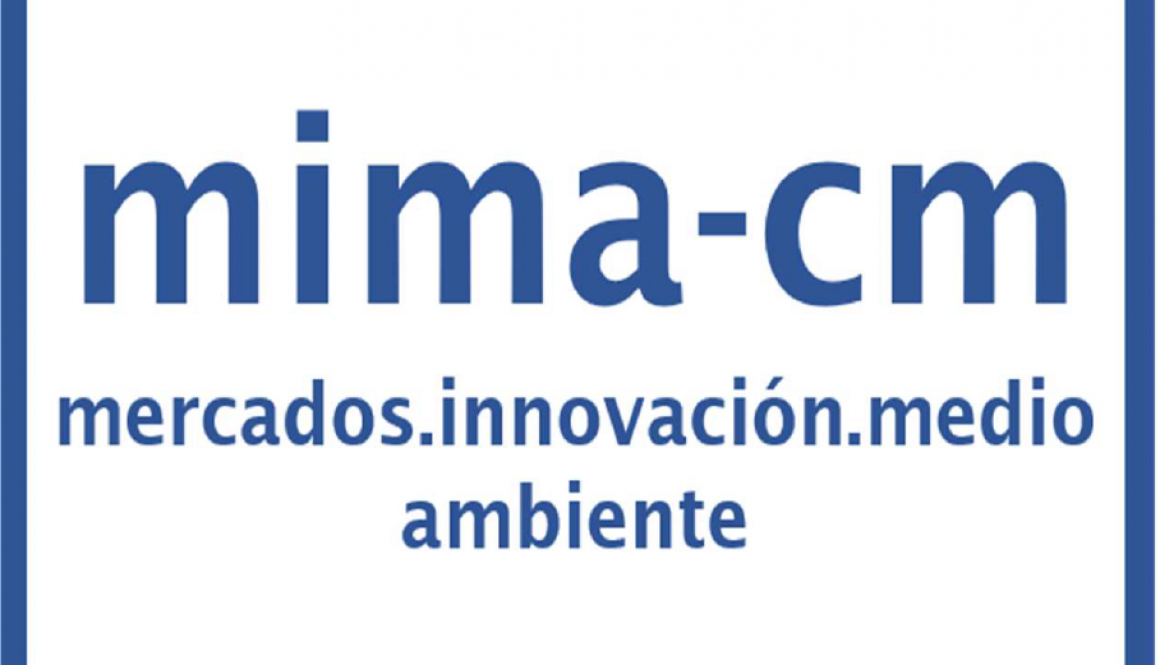
MIMA-CM Research Grant
The Regional Government of Madrid (CAM) has awarded a three-year research grant to the consortium made up of four academic institutions: CSIC, CEMFI, Carlos IIII and Complutense.
The name of the project is MIMA-CM, that stands for Markets, Innovation and the Environment. The objective of the grant is to study four essential aspects for new models of capital attraction and employment from the economic point of view: incentives for innovation, the energy transition, the competition, and regulation.
The group at Carlos III is composed of researchers in the area of Industrial Organization, including Natalia Fabra, Georges Siotis, Alan Crawford and Imelda.


2nd PhD Summer School on “Economic Foundations for Energy and Climate Policies”
Given the current COVID situation we have decided to postpone the PhD Summer School on “Economic Foundations for Energy and Climate Policies” until September 2021. More information will be provided on the website and a new call for submissions will be published next year.
We are pleased to announce that we will be organizing the second edition of the PhD Summer School on “Economic Foundations for Energy and Climate Policies”, which is jointly promoted by DIW Berlin, EUI-Florence School of Regulation, Technical University Berlin, Universidad Autónoma de Madrid, University College London and Université Libre de Bruxelles. The School will combine lectures and policy sessions by leading researchers and policy makers in the field.
The Summer School will be held on September 7-11, 2020 at Universidad Carlos III de Madrid (Downtown campus at Puerta de Toledo)
Confirmed instructors:
- Stefan Ambec (Toulouse School of Economics): “Intermittency of Renewable Energy: Implications for Electricity Markets”
- Estelle Cantillon (Université Libre de Bruxelles): “Design and Development of the EU’s ETS”
- Xavier Labandeira (Universidade de Vigo): “A Primer on Environmental Taxes and Green Tax Reforms”
- Juan Pablo Montero (Pontificia Universidad Católica de Chile): “Environmental Regulation and the Transport Sector”, and “The Design of Environmental Instruments”
The main objective of the School is to provide PhD students in Economics with high-level academic training on the micro-economic foundations of energy and climate policies. The School is also aimed at supporting the development of a PhD-student network for students interested in the topic, and connect them with top academics in the field.
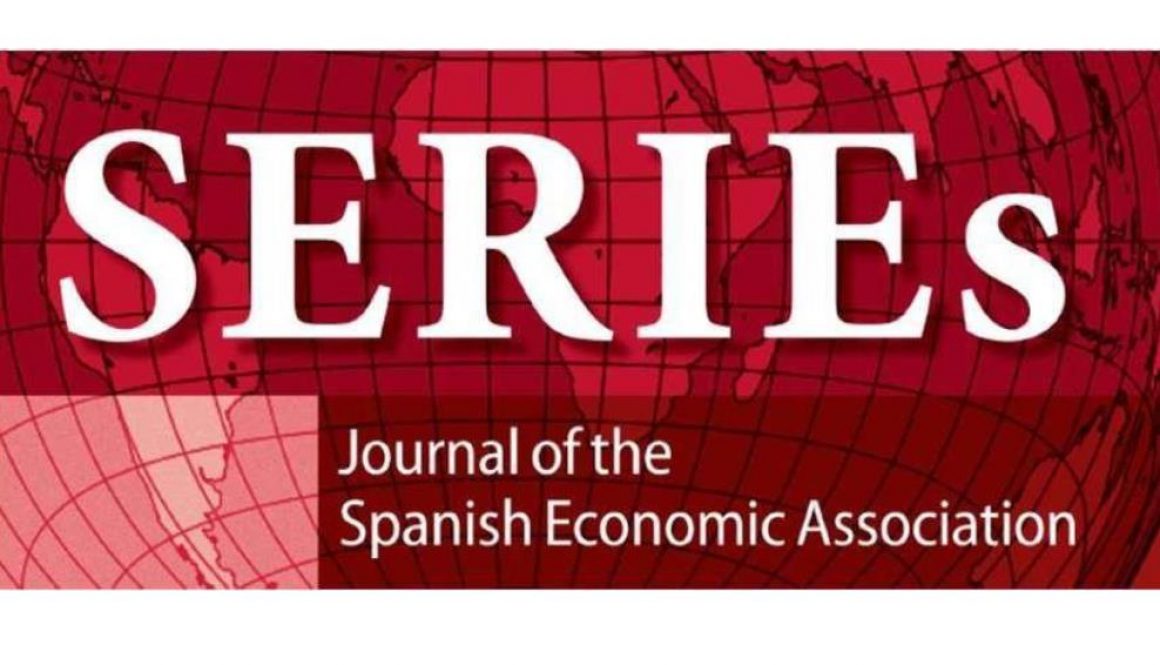
SERIEs Special Issue on The Economics of the Energy Transition
The Journal of the Spanish economic association (SERIEs) has just published the Call for Papers of a Special Issue on the Economics of the Energy Transition. The Guest Editors are Natalia Fabra
(Universidad Carlos III de Madrid) and Xavier Labandeira (Universidade de Vigo)
Scope of the Special Issue: The so called energy transition, i.e. the energy-related transformations to reach decarbonized societies, will have profound socio-economic implications. In this issue we are looking for rigorous theoretical and empirical papers that contribute to understand the main policy challenges and macro and microeconomic effects associated with the energy transition. Among others, we invite submissions that cover the following topics:
- Public policies related to energy and climate mitigation
- Distributional impacts of the energy transition
- Effects of the energy transition on growth and job creation
- Sustainable finance and its contribution to the energy transition
- Political economy issues related to the energy transition
- The role of companies in the energy transition
**Extended deadline: July 15, 2020**
Submissions Instructions: Full manuscripts should be submitted electronically through the web page of the Journal of the Spanish Economic Association-SERIEs (link). Please, remember to select the option “SI: The Economics of the Energy Transition” in the prompt for “Select article Type”. First decisions and comments will be sent out no later than September 1, 2020.
The Journal of the Spanish Economic Association-SERIEs is a single-blind peer-reviewed open access journal published under the brand SpringerOpen. The journal publishes scientific articles in all areas of economics. The Web of Science two-year impact factor is 0.833 in 2018 and in Scopus, it is among Q1 journals (top 25%) in 2018 according to Scimago Journal Ranking and the CiteScores.
Link to the Call for Papers
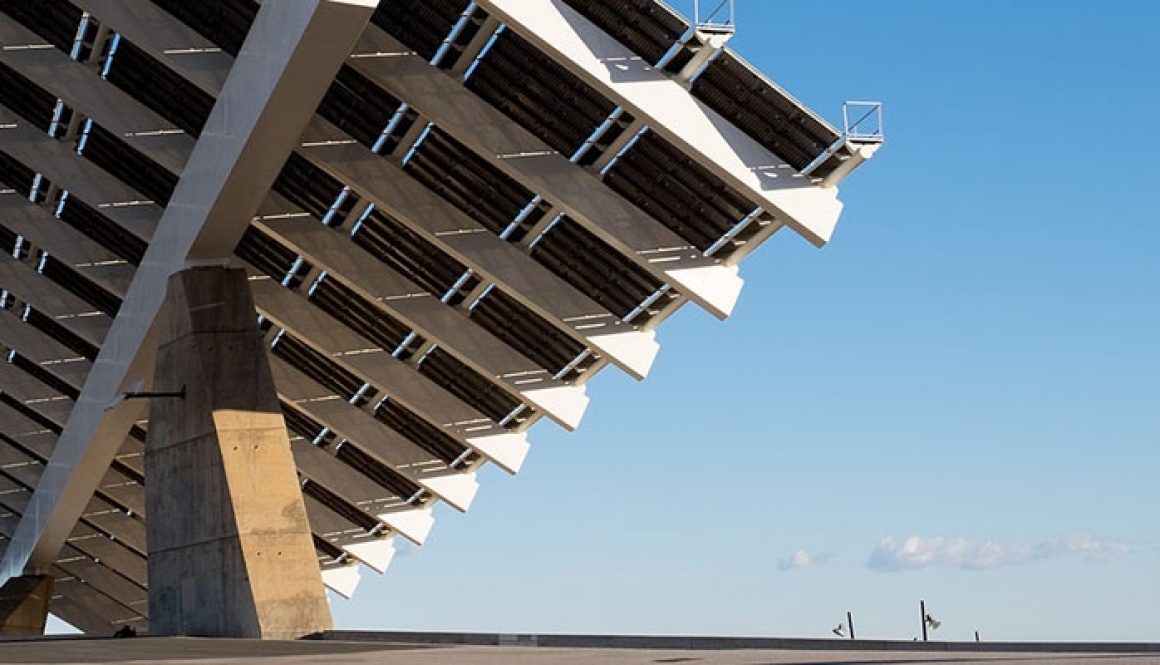
Professional Course on The Energy Transition: Economics and Policy
Worldwide, the energy transition is underway. Whereas there is consensus regarding the need to reduce carbon emissions, promote renewables, and improve energy efficiency, there is still controversy regarding the optimal choice of policies to achieve those goals.
Policies differ in their efficiency impacts (i.e., whether they induce higher or lower costs), but also on their distributional implications (i.e., whether they create winners and losers). Furthermore, agents’ behavioral biases might impact the success or failure of the chosen policies.
With this triple focus on efficiency, equity and behavioral considerations, the Intensive Course on The Energy Transition: Economics and Policy, which will take place at the Barcelona GSE on June 11-12 2020, will provide participants (whether economists, engineers, or lawyers, working for firms or in regulatory agencies) with a thorough understanding of the most recent economic insights to analyze the performance of current and potential energy and climate policies. The course will mainly review policies affecting the transportation and power sectors, as well as the competition policy issues that are likely to arise during the energy transition. The program’s faculty includes leading international scholars and practitioners with extensive experience of the application of economic techniques to designing and assessing the performance of energy and climate policies. The Directors of the course are Massimo Motta (BGSE) and Natalia Fabra, head of EnergyEcoLab.
More information at
https://www.barcelonagse.eu/st
